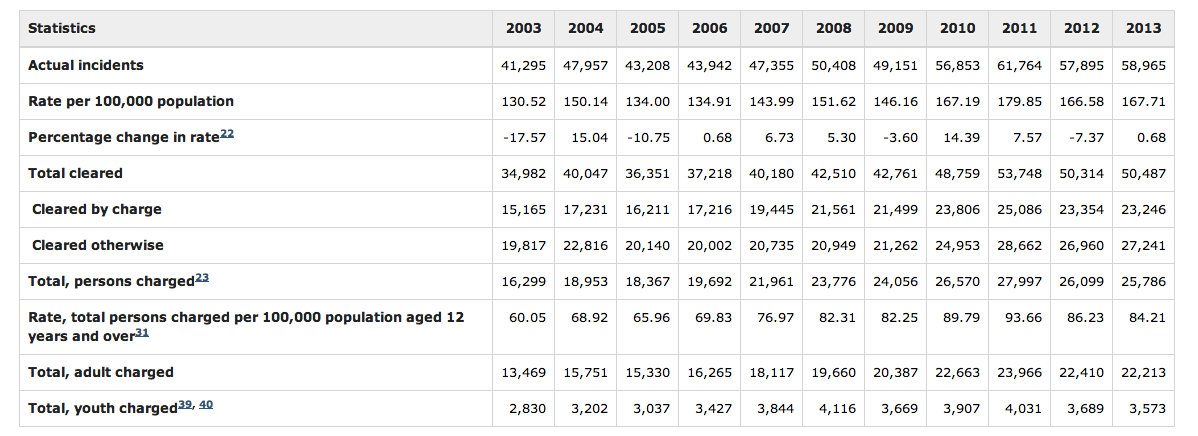Up in Smoke: A Lack of Rationality on Marijuana
The return of the ‘prince of pot’ – Marc Emery to Canada has once again raised the important issue of the criminalization marijuana (legalization please).
Yesterday – while stuck at home still recovering from a tonsillectomy – I came across a Sun News TV spot where Justin Ling and Marissa Semkiw discussed the pot issue.
Maybe it was the pain killers – but Semkiw’s comments on the criminalization of marijuana were simply shocking and irresponsible (here is a link to the video). Toward the end of the video Semkiw says:
“We are talking convictions here […] Lets be clear Justin […] Marijuana is defacto decriminalized – ok – you get nothing more than a slap on the wrist”
What?!?
Lets be clear Semkiw – it is a currently a crime to possess any amount – even a gram – of marijuana. It is an offence to grow pot. It is an offence to sell pot
You are a drug trafficker – according to our laws – when you pass a joint to a friend.
No Marissa – Marijuana is not defacto decriminalized and to call criminal sanctions as a ‘slap on the wrist’ represents a gross misunderstanding of the consequences of simply being charged (leaving aside the possibility of being convicted) of a drug offence.
Last year approximately 50,000 people were arrested for possessing marijuana. Ultimately 25,786 charges for simple possession of pot were laid by Canadian police forces. The numbers fluctuate from year to year but since 2003 there has been a 60% increase in the number of possession charges laid by police.
Additionally, the rate of laying a charge following an arrest remains virtually unchanged – there has been no real increase in the use of police discretion divert marijuana charges.


Statistics Canada data on charges for simple possession of marijuana
Semkiw’s irresponsible comments ignore the facts and the data.
More importantly Semkiw ‘slap on the wrist’ comment ignores the devastating impact of being charged – let alone convicted – of a drug offence.
Perhaps Semkiw has not read the John Howard Society of Ontario and the Canadian Civil Liberties Association (CCLA) damning reports on police record checks and their societal effects.
If being charged is a slap on the wrist being convicted of a pot offence is an amputation.
A criminal drug record carries with it negative stigma and can adversely effect employment, travel (even more so than a violent offence), education, housing, and ultimately reintegration.
These adverse impacts are more likely to manifest on those who already find themselves in a disadvantaged positions.
Semkiw dangerously minimizes the impacts of the criminalization of marijuana.
She tweeted me:
@mspratt There are many arrests. Fewer prosecutions. Fewer convictions.
— Marissa Semkiw (@MarissaSemkiw) August 14, 2014
As I have said ‘many arrests’ are in and of itself is a bad thing.
I am not sure where Semkiw get her ‘fewer prosecutions’ and ‘fewer convictions’ data.
There is – in fact – very little data available about the amount of prosecutions or ultimate sentences for marijuana offences. In my view – a view I would wager most criminal law practitioners would share – the anecdotal evidence is clear – people do go to jail for pot possession – people do get criminal records for smoking a joint.
To make matters worse there also exist massive and arbitrary disparities throughout Canada over how marijuana laws are applied – so much for fairness.
Semkiw is simply off base – but she is not alone.
Anthony Moustacalis, president of the Criminal Lawyers’ Association (of which I am a past board member) made some baffling comments to the CBC this week about the enforcement of marijuana laws.
Moustacalis said that he believes that the number of marijuana possession charges tends to fluctuate, but that they’re generally down.
Now, this is true – if you only look at the last year – and only if you look at major cities.
Charges are up over the last ten years and were up in some areas of the country this year too – for example in our nation’s capital – Ottawa saw a 9% increase.
Moustacalis risks minimizing the problematic issue but he went on to make an even more baffling comment:
“On the one hand, [police] don’t want to chase people for small amounts of marijuana,” added Anthony Moustacalis, president of the Criminal Lawyers’ Association. “On the other hand, it’s sometimes helpful for police to have that in their back pocket if they want to do more intrusive searches of people.”
Wait – what – police will lay a pot charge as a pretext to allow them to conduct a more intrusive search!
I have no doubt there is truth to this – but – where is the outrage from the president of the CLA!
There should be inquires into this type of police behaviour – not dismissive (and sort of accepting) comments.
When we start talking about pot logic seems to be the first casualty – disappearing in a puff of smoke.
It may be worth reflecting on former Supreme Court of Canada Judge Louise Arbour’s reasons in R. v Malmo-Levine (in my view one of the greatest dissenting opinions ever written) when we think about pot and the criminal law:
The prohibition of simple possession of marihuana attempts to prevent a low quantum of harm to society at a very high cost. A negligible burden on the health care and welfare systems, coupled with the many significant negative effects of the prohibition, do not amount to more than little or no reasoned risk of harm to society.
Unfortunately Arbour was in the minority in 2003 and given some of the comments in recent days it appears that ignorance is still bliss.